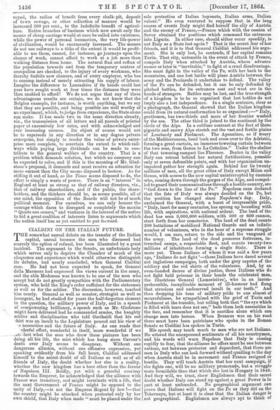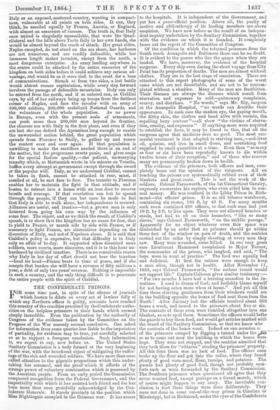CIALDINI ON THE ITALIAN FUTURE. T HE somewhat unreal debate on
the transfer of the Italian capital, unreal because the men who discussed had scarcely the option of refusal, has been illustrated by a great incident. The argument in the Senate, an unfortunate body which serves only to deprive the Chamber of much of the eloquence and experience which would otherwise distinguish its debates, had nearly concluded, when General Cialdini rose. He had not been expected to speak, for General della Marmora had expressed the views current in the army, and the able Modenese was known to be one of the men who accept but do not greatly sympathize with the Parliamentary system, who hold the King's order sufficient for the statesman as well as for the soldier. The discussion, however, touched him nearly. General as well as senator, strategist as well as insurgent, he had studied for years the half-forgotten element in the question, the military power of Italy, and in a speech of overpowering brilliancy, a speech such as Mr. Gladstone might have delivered had he commanded armies, the haughty soldier and disciplinarian who told Garibaldi that his red ihirt was an insult to the Legislature poured out his view of e necessities and the future of Italy. As one reads that -tderful effort, wonderful in itself, more wonderful if we .e0,11ect what the man who drew those pictures has been doing all his life, the mist which has hung since Cavour's death over Italy seems to disappear. Without one dangerous allusion, without one offensive expression, yet speaking evidently from his full heart, Cialdiui addressed himself to the secret doubt of all Italians as well as of all friends of Italy, the doubt whether her rise is a reality, whether the new kingdom has a base other than the favour of Napoleon III. Boldly, yet with a graceful courtesy towards the Emperor, he acknowledged that the alliance with France was transitory, and might terminate with a life, that the next Government of France might be opposed to the unity of Italy,--is not the Empress Regent by law ?—that the country might be attacked when protected only by her own shield, that Italy when made "must be placed under the sole protection of Italian bayonets, Italian arms, Italian valour." He even ventured to suppose that in the long course of events Italy might find herself the ally of Austria and the enemy of France,—France which with the cession of Savoy obtained the positions which command the entrances into Liguria. In either case, should either occur speedily, is not Italy as a State lost again ? That is the secret fear of her friends, and it is to that General Cialdini addressed his argu- ment. She is only lost, he contends, if her capital remains Turin. That city, untenable in the event of attack by France,. compels Italy when attacked by Austria, whose advance sooner or later is "inevitable," to fight at a cruel disadvantage. She must fight in the valley of the Po, with her back to the mountains, and one lost battle will place Austria between the- army and the Peninsula it undertakes to defend. The valley of the Po can be defended, but it can be only defended by pitched battles, for its entrances east and west are in the- hands of strangers. Battles may be lost, and the true strength of a kingdom is to be so organized that lost battles do not imply also a lost independence. In a single sentence, clear as a photograph, the General showed that the Italian kingdom. could from its natural conformation be so organized :—" gentlemen, has two-thirds and more of her frontier washed by the sea. The other third is joined to the continent by the circle of the Alps. In a sublime contrast at the foot of these gigantic and snowy Alps stretch out the vast and fertile plains of Lombardy and Piedmont. The Apennines, as if weary of the Mediterranean, bend back and cross over to the Adriatic, forming a great curtain, an immense towering curtain between the two seas, from Genoa to La Cattolica." Under the shelter of that towering rampart lies Florence. Beaten in the valley Italy can retreat behind her natural fortifications, passable only at seven defensible points, and with her organization un- impaired gather her strength again. Behind her lie twenty millions of men, all the great cities of Italy except Milan and Genoa, with access to the new capital uninterrupted by enemies who, coming down through the gorges of the Alps, and compel- led to guard their communications through a hostile country, are "tied down to the line of the Po." Napoleon once declared, that the fate of Italy was always decided on the Po, but the position has changed since Napoleon's day. Italy,. exclaimed the General, with a burst of irrepressible pride, "Italy, inert for many centuries, has sprung up bounding with life, with aspirations, with national ardour. The land of the dead has seen 3,000,000 soldiers, with 500 or 600 cannon, start forth from her cemeteries. The land of the dead counts 200 battalions of mobilized National Guards and an infinite number of volunteers, who in the hour of a supreme struggle would, I am sure, return to the side and the vanguard of the army. The land of the dead possesses fortresses, in- trenched camps, a respectable fleet, and counts twenty-two millions of inhabitants forming a single State. There is more yet. Those Italians of whom it was said a few years ago, Italians do not fight '—those Italians have dared several not inglorious campaigns, both under the grey oapotes of the soldiery and the red shirts of the volunteers. And, by an even-handed decree of divine justice, those Italians who do- not fight held prisoner in their hands the celebrated man, the illustrious General (Lamoriciere), who in an incom- prehensible, inexplicable moment of ill-humour had flung that atrocious and undeserved insult in our teeth." And then dropping his tone of military pride to one almost of mournfulness, he sympathized with the grief of Turin and Piedmont at the transfer, but telling both that "the eye which is filled with tears does not see," bade them look necessities in the face, and remember that it is sacrifice alone which can change men into heroes. When Brennus was on his road there must have been patricians who spoke in the Roman Senate as Cialdini has spoken in Turin. His speech may teach much to men who are not Italians. He uttered the unexpressed sentiments of all his countrymen, and his words will warn Napoleon that Italy is ceasing rapidly to fear, that the alliance he offers must be one between nations, not between protector and dependent, that there are men in Italy who can look forward without quailing to the day when Austria shall be in movement and France resigned or hostile. They will teach Austria that her next campaign, if she fights one, will be no military promenade, but a struggle more formidable than that which she lost in Hungary in 1848. And they will, we trust, show Englishmen that their secret doubt whether Italy can stand up against a great Power is in part at least unfounded. No geographical argument can prove that Italians will fight on the Po as they did on the Tchernaya, but at least it is clear that the Italian danger is not geographical. Englishmen are always apt to think of Italy as an exposed, scattered country, wanting in compact- ness, vulnerable at all points on both sides. It can, they think, be assailed equally by France, Austria, or England, with almost an assurance of success. The truth is, that Italy once united is singularly unassailable, that were the Quad- rilateral and the hills above Turin fully in her own hands, she would be almost beyond the reach of attack. Her great cities, Naples excepted, do not stand on the sea shore, her harbours are not numerous, and are readily defensible, while her immense length makes invasion, except from the north, a most dangerous enterprise. An army landing anywhere in the centre could be attacked by the entire resources of the kingdom on both sides before it could achieve any serious ad- vantage, and would be as it were tied to the coast for a base of communications. Struck at from two sides, a lost battle would almost ensure capitulation, while every step forward involves the passage of defensible mountains. Italy can only be entered from the north, and if so entered can, as Cialdini says, by aid of her railways bring up troops from the farthest corner of Naples, and face the invader with an army of 300,000 soldiers, 200,000 mobilized National Guards, and the volunteers of the whole population. As no power in Europe, even with the present scale of armaments, can push more than 200,000 men beyond its frontier, the chances are with Italy in the first place, and even if they are lost she can defend the Apennines long enough to enable the unwounded nation behind, the great population which spreads from Florence to Sicily, to gather up and renew the contest over and over again. If that population is unwilling to make the sacrifices needed there is an end of the matter, but the programme averts panic, and gives scope for the special Italian quality,—the patient, unwearying tenacity which, as Metternich wrote in his minute on Venetia, baffles every attempt at government except through the sword or the popular will. Italy, as we understand Cialdini, cannot be taken in flank, cannot be attacked in rear, must, if assailed at all, be met face to face. The transfer to Florence enables her to maintain the fight in that attitude, and if beaten to retreat into a house with an iron door to recover breath and courage. If that conviction can but be spread through the people, if they can but once be made to feel that Italy is able to walk alone, her independence is secured. Alliances are useful, and treaties—but a grown man is only deterred from going his own way by the influence of some fear. The object, and as we think the result, of Cialdini's speech, is to show that the kingdom has no cause for fear, that to yield to France, or march side by side with France, or if necessary- to fight France, are alternatives depending on the discretion of Italy, and not of Napoleon alone. It is said that Cialdini's policy is expensive, but that difficulty is in Italy only an affair of to-day. It supported when disunited more soldiers, more courts, more sinecures, and it is to this hour un- burdened by civilized taxation. There is no conceivable reason why Italy in her day of effort should not bear the taxation —head for head—France bears in time of peace, and if she accepts that burden she will have a revenue of fifty millions a year, a debt of only two years' revenue. Nothing is impossible in such a country, and the only thing difficult is to penetrate the entire people with the spirit of Cialdini.































 Previous page
Previous page